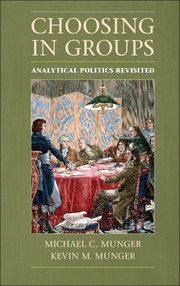Book contents
- Frontmatter
- Dedication
- Epigraph
- Contents
- List of Figures
- List of Tables
- Preface
- I Basics
- 1 The Analysis of Politics
- 2 Becoming a Group: The Constitution
- 3 Choosing in Groups: An Intuitive Presentation
- 4 The Analytics of Choosing in Groups
- II Spatial Theory
- III Extensions
- Answers to Selected Exercises
- Notes
- References
- Index
2 - Becoming a Group: The Constitution
Published online by Cambridge University Press: 05 February 2015
- Frontmatter
- Dedication
- Epigraph
- Contents
- List of Figures
- List of Tables
- Preface
- I Basics
- 1 The Analysis of Politics
- 2 Becoming a Group: The Constitution
- 3 Choosing in Groups: An Intuitive Presentation
- 4 The Analytics of Choosing in Groups
- II Spatial Theory
- III Extensions
- Answers to Selected Exercises
- Notes
- References
- Index
Summary
There is but one law which, from its nature, needs unanimous consent. This is the social compact; for civil association is the most voluntary of all acts.… Apart from this primitive contract, the vote of the majority always binds all the rest. This follows from the contract itself. But it is asked how a man can be both free and forced to conform to wills that are not his own. How are the opponents at once free and subject to laws they have not agreed to?
I retort that the question is wrongly put. The citizen gives his consent to all the laws, including those which are passed in spite of his opposition, and even those which punish him when he dares to break any of them. Rousseau, Book IV, Chapter 2, “Voting”
Three broad subjects interest political theorists: axiology, or the knowledge of ethics and “the good;” ontology, the knowledge of being and existence; and epistemology, the knowledge of knowledge and knowing. We want to know, for example: What is the good society? What are the types or categories of human societies? How do we assess empirical evidence to understand the effects of real policies on that society?
The study of voting and collective choice most often has been conceived as a problem in epistemology. That is, given that we – the members of a group – all want something, how do we know if a particular voting system can lead us to it? If the “right thing to do” is known to exist, the problem is making sure that voting processes can help discover it.
- Type
- Chapter
- Information
- Choosing in GroupsAnalytical Politics Revisited, pp. 26 - 41Publisher: Cambridge University PressPrint publication year: 2015



